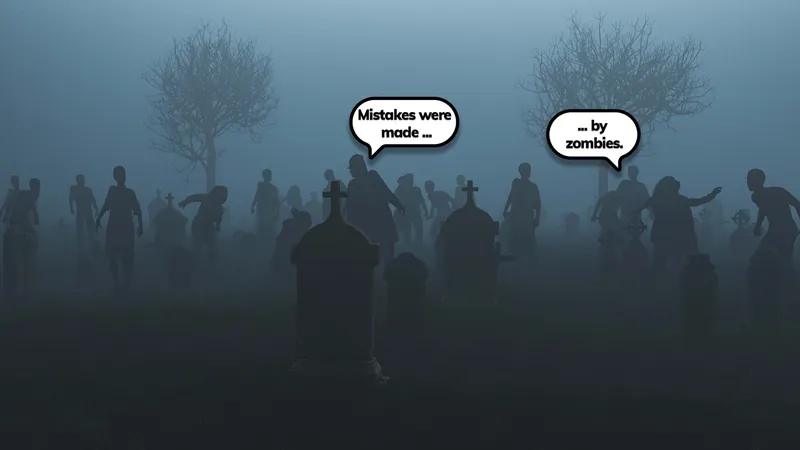
The Passive Voice Dilemma: Unraveling the Myths and Realities of Grammar's Most Misunderstood Form
2024-10-14
Author: Ken Lee
Active vs. Passive: The Basics
Let’s break down the essentials: in an English sentence, the subject usually performs an action on the object. For example, in the active voice, you might say, "The dog (subject) chased the ball (object)." When we pivot to passive voice, the object becomes the star: "The ball was chased by the dog."
A fun and effective way to determine if a sentence is in the passive voice is through the "zombie test," a quirky technique introduced by Marine Corps University provost Rebecca Johnson. Simply add "by zombies" after the verb. If the sentence still makes logical sense, congratulations! You’re dealing with passive voice. Take a look at these two examples: - "The document was signed (by zombies) — Passive voice confirmed!" - "She was happy (by zombies) — Nope, this is not passive."
The Misidentification Epidemic
The confusion surrounding the passive voice can largely be traced back to prominent grammar guides that instill a fear of this construction. One such classic is William Strunk's "The Elements of Style," which inaccurately classified certain sentences as passive. For instance, Strunk claimed that "There were a great number of dead leaves lying on the ground" was an example of passive voice, but a closer look (and the zombie test) makes it clear that it isn't passive at all.
Influential writers, including Washington Post columnist Alexandra Petri, have also muddled the waters. She pointed to a specific sentence, asserting that it implicated passive voice when, in reality, it did not. Even style guides from reputable sources like the BBC have fallen prey to this misunderstanding, mistakenly categorizing innocent sentences as passive.
Why Do Experts Get It Wrong?
The misapprehension stems partially from the terminology itself. The phrases "active" and "passive" evoke misleading associations. For example, the sentence "I slept" is active, but "I was attacked by zombies" is inherently passive despite implying inactivity.
Another factor is the lingering belief that passive voice is synonymous with weak or ambiguous writing. George Orwell famously criticized its use, deeming it a way to shirk responsibility. Yet, curiously, he wielded passive constructions approximately 20% of the time in his own essay "Politics and the English Language." The conclusion? It's crucial to remember that the passive voice is not inherently evasive—it all boils down to context and intent.
The Hidden Value of Passive Voice
Despite the negativity surrounding it, the passive voice serves a fundamental purpose in sentence structure and information arrangement. For instance, it emphasizes the action or outcome rather than the actor. This can be pivotal in making the intended message clearer.
Consider a passage about a technology company: "XYZ Corporation has been a leader in the tech industry for over a decade. Founded in 2010, the company quickly garnered a reputation for innovation. In 2015, a prestigious industry award was given to XYZ Corporation for its commitment to excellence."
The use of passive voice in the latter part keeps the focus on the company and its achievements. However, things get trickier with certain sentence constructions known as ditransitives. In the context of a passive sentence like "XYZ Corp was awarded a prestigious industry prize," it may be challenging to add "by zombies" immediately after the verb due to grammatical constraints.
Ultimately, the passive voice plays a vital role in how information is structured and perceived. It can enhance clarity and focus, integrating ideas effectively.
Takeaway Message: Embrace, Don’t Fear the Passive Voice
As we navigate the complexities of grammar, let’s not demonize the passive voice. Instead, recognize its power in shaping meaning and focus within our writing. Whether you're chronicling your adventures or providing critical analysis, understanding the nuances of passive constructions will elevate your narrative craft. So the next time you encounter passive voice, remember: it’s not the grammatical form that's the enemy—it's our approach to utilizing it that truly counts!


 Brasil (PT)
Brasil (PT)
 Canada (EN)
Canada (EN)
 Chile (ES)
Chile (ES)
 España (ES)
España (ES)
 France (FR)
France (FR)
 Hong Kong (EN)
Hong Kong (EN)
 Italia (IT)
Italia (IT)
 日本 (JA)
日本 (JA)
 Magyarország (HU)
Magyarország (HU)
 Norge (NO)
Norge (NO)
 Polska (PL)
Polska (PL)
 Schweiz (DE)
Schweiz (DE)
 Singapore (EN)
Singapore (EN)
 Sverige (SV)
Sverige (SV)
 Suomi (FI)
Suomi (FI)
 Türkiye (TR)
Türkiye (TR)